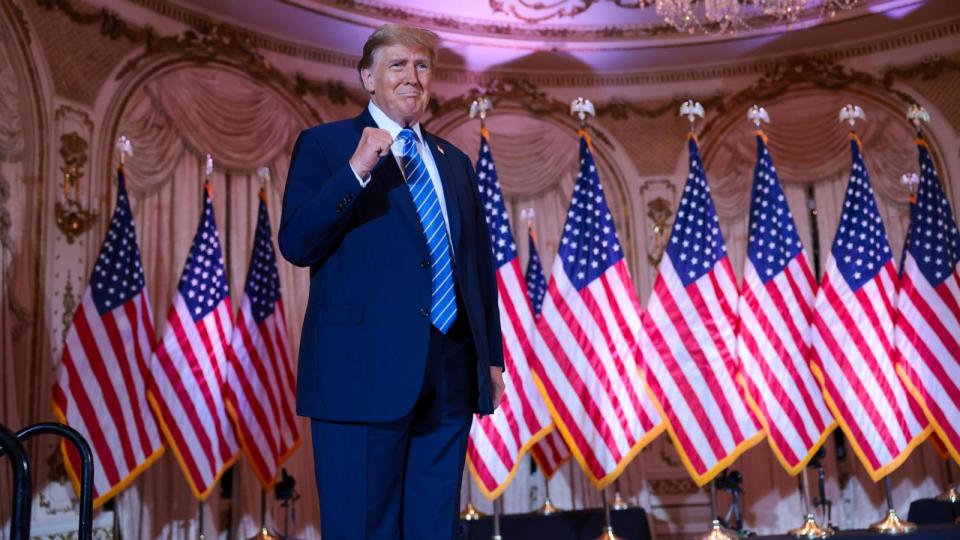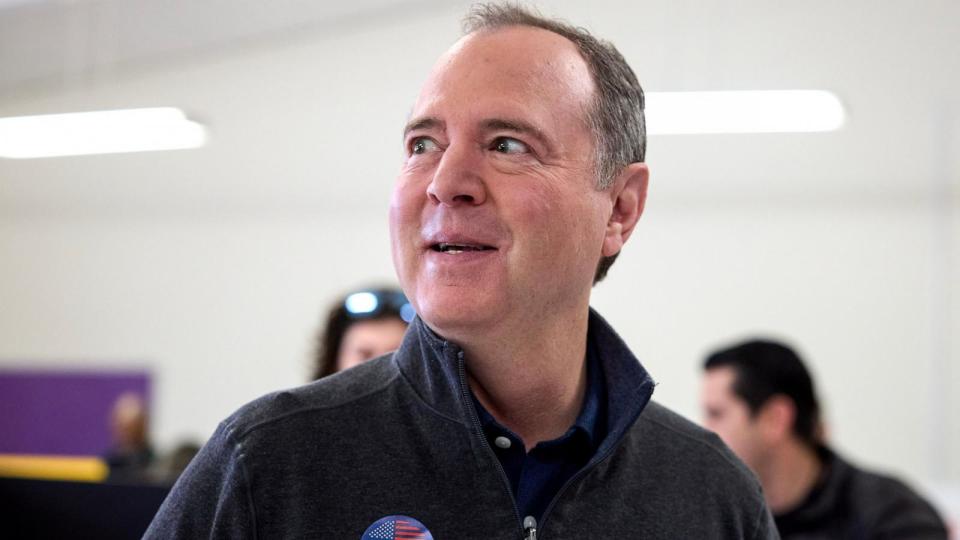Super Tuesday sets up a Biden vs. Trump rematch, and 4 more takeaways
Former President Donald Trump and President Joe Biden are projected to have handily won their respective primaries on Super Tuesday, even if a clean sweep proved elusive for them both.
Trump is projected to only lose the Vermont primary to former South Carolina Gov. Nikki Haley, whose own future remains up in the air after Tuesday.
And Biden was defeated in the American Samoa primary, though that contest is not believed to be indicative of his broader standing in the Democratic Party as it attracted only about 100 votes.
The results set up the general election between Trump and Biden -- some eight months away -- as well as races for several key down-ballot contests.
Here are five takeaways from Super Tuesday.
Trump trounces Haley
Trump continued to perform well -- and sometimes very well -- in the GOP primaries, handily defeating Haley in most states, ABC News projects.
Even though he is set to lose Vermont by single digits, his margins elsewhere were strong: He was ahead of Haley by more than 50 points in delegate-rich California with just under half of the expected vote tallied; he was ahead of Haley by over 60 points in Texas with over 80% of the expected vote counted; and he broke 80% of the vote in Alabama with more than 90% of expected ballots reported.
Thus far, he's only lost Vermont and the District of Columbia, though neither is anticipated to amount to anything more than a speed bump on his path to his third straight Republican nomination. (Haley won less than 40,000 votes between Vermont and the district. By comparison, Trump won more than 450,000 votes in Haley's home state of South Carolina.)
MORE: Conservatives propel Trump to Super Tuesday victories: Exit polls
Trump did perform far better in rural areas than in cities and suburbs, which will likely fuel further questions about how he'll perform with those groups in November given that they've shifted away from him since 2016.
Notably, 78% of Haley voters in the North Carolina Republican presidential primary, 69% in California and 68% in Virginia were unwilling to say they'll support the party's nominee whoever it is, according to preliminary exit polls.
However, history shows that a messy primary doesn't guarantee defeat in the general: Trump struggled to even win majorities in multiple 2016 GOP nominating contests, and Sen. Ted Cruz, R-Texas, proved a far more formidable foe at the time than Haley has this year. But Trump was still able to coalesce much of the party by November 2016, earning the support of 90% of Republicans, per exit polling.
Haley suspends race
Trump's path to the nomination seems clear with now that Haley suspended her race Wednesday morning. The South Carolina Republican, a former Trump ambassador who has become a vocal critic of his influence over the party while running against him, made history by being the first Republican woman to win a presidential primary.
MORE: Nikki Haley to end presidential campaign, as last major Trump rival exits GOP race: Sources
But she's also been faced mounting speculation over when -- not if -- she would suspend her campaign amid so many other repeated losses. Haley had insisted that she would stay in the race through Super Tuesday and aim to be "competitive."
"Unity is not achieved by simply claiming 'we're united.' Today, in state after state, there remains a large block of Republican primary voters who are expressing deep concerns about Donald Trump. That is not the unity our party needs for success. Addressing those voters' concerns will make the Republican Party and America better," Haley spokesperson Olivia Perez-Cubas said.
Biden breezes through, but non-Biden votes stick out
The president had a good night based on the results, routinely getting at least 80% of the vote in many states with much but not all of the ballots counted.
Other than a quirky defeat in American Samoa, the campaign performed well and is projected to win all 15 Democratic states as Biden looks to kick into high gear against Trump.
"As we continue to watch results come in from states across the country, including my home state of California, this is an energizing moment for our campaign," Vice President Kamala Harris said in a statement.
Still, potential dissatisfaction among Democratic voters -- particularly in some swing states -- lurked under the surface.
The "uncommitted" option had earned about 19% of the vote in Minnesota with about 89% of the expected vote reported. That choice was being pushed by some advocates as a protest vote over Biden's handling of Israel's war against Hamas in Gaza. Separately, 13% of Democratic primary voters in North Carolina voted "no preference" with almost all ballots reported.
Those numbers come after more than 100,000 Democratic primary voters in Michigan voted "uncommitted," too.
"In Minnesota and across other states on Super Tuesday, we are joining, just like in Michigan, the uncommitted vote, which is really a strong protest vote that President Biden needs to listen to his constituents," organizer Jaylani Hussein said on ABC News Live earlier Tuesday.
The general election kicks off
Trump and Biden have never really come close to losing their polling leads in their primary races and began winning contests in January as soon as voting started.
But Tuesday night, one thing was clear from the results and their messaging: The general election is officially on.
In his victory speech, Trump didn't mention Haley once, focusing his fire solely on Biden.
"All of the problems that you have today, I don't think you would have had any of them, you'd only have success. And that's what's ultimately going to unify this country and unify this party. We have a great Republican Party with tremendous talent. And we want to have unity and we're going to have unity and it's going to happen very quickly," he said in a speech at his Mar-a-Lago property in Florida.

"We're going to win this election," he said. "If we lose this election, we're not going to have a country anymore."
Biden had a similar focus: Trump and the threat that Biden argues he poses to democracy.
"Tonight's results leave the American people with a clear choice: Are we going to keep moving forward or will we allow Donald Trump to drag us backwards into the chaos, division, and darkness that defined his term in office?" the president said in a statement.
"My message to the country is this: Every generation of Americans will face a moment when it has to defend democracy. Stand up for our personal freedom. Stand up for the right to vote and our civil rights. To every Democrat, Republican, and independent who believes in a free and fair America: This is our moment," Biden said. "This is our fight. Together, we will win."
MORE: Where will Haley's anti-Trump supporters go if she ends her campaign?
Key down-ballot races set up
Along with the White House race, the battle for the Senate, House and a key governorship were also put in sharp relief Tuesday.
Democratic Rep. Adam Schiff is projected to face off against Steve Garvey, the leading Republican candidate in California's Senate race to succeed the late Sen. Dianne Feinstein. The state has a jungle primary, meaning the top two vote-getters advance to the general election.
Rep. Katie Porter, another Democrat, was also running with colleague Barbara Lee against Schiff. Had either of them earned one of the top spots, it would have set up a likely expensive intraparty battle that could have diverted donor money from key House races in California or other states.

Voters on Tuesday also set up a contest between Sen. Ted Cruz, R-Texas, who is running for a third term, and Democratic Rep. Colin Allred, who is trying to unseat him and finally nab a statewide seat for Democrats in Texas -- long a white whale for the party.
And North Carolina's gubernatorial race is projected to see Lt. Gov. Mark Robinson, a Republican, and Democratic Attorney General Josh Stein face off against each other in the marquee race for a governor's mansion this year.
The results also established the two contenders for key House races in California later this year, and in Alabama, Republican Rep. Barry Moore is projected to win a redistricting-driven incumbent-on-incumbent race against fellow GOP Rep. Jerry Carl.
Super Tuesday sets up a Biden vs. Trump rematch, and 4 more takeaways originally appeared on abcnews.go.com

 Yahoo News
Yahoo News 
